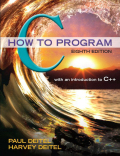
EBK C HOW TO PROGRAM
8th Edition
ISBN: 9780133964639
Author: Deitel
Publisher: PEARSON CUSTOM PUB.(CONSIGNMENT)
expand_more
expand_more
format_list_bulleted
Question
Chapter 12, Problem 12.19E
Program Plan Intro
Program plan:
- item, root, d variableare used for input. There is structure Treenode havingdata, leftptr, rightptr member variables which represents the tree node.
- void insertnode(node **ptr, int value) function inserts the node in the tree and create a tree.
- void inorder(node *ptr) function display the tree values in sorting order.
- int depth(node *ptr) determine the height of depth of tree and return max depth between left or right nodes path.
Program description:
The main purpose of the program is to create binary search tree, display the tree values and measure and display the depth of the tree.
Expert Solution & Answer
Want to see the full answer?
Check out a sample textbook solution
Students have asked these similar questions
Answer this JAVA OOP question below:
An Employee has a name, employee ID, and department. An Employee object must be created with all its attributes. The UML diagram is provided below:
- name: String - employeeId: String - department: String
+ Employee(name: String, employeeId: String, department: String) + setName(name: String): void + setEmployeeId(employeeId: String): void + setDepartment(department: String): void + getName(): String + getEmployeeId(): String + getDepartment(): String + toString(): String
A faculty is an Employee with an additional field String field: rank
public class TestImplementation{
public static void main(String[] args){
Employee[] allEmployee = new Employee[100];
// create an employee object with name Tom Evan, employee ID 001 and department IST and store it in allEmployee
// create a faculty object with name Adam Scott, employee ID 002, department IST and rank Professor and store it in allEmployee } }
Please answer this JAVA OOP question that is given below:
An Employee has a name, employee ID, and department. An Employee object must be created with all its attributes. The UML diagram is provided below:
- name: String - employeeId: String - department: String
+ Employee(name: String, employeeId: String, department: String) + setName(name: String): void + setEmployeeId(employeeId: String): void + setDepartment(department: String): void + getName(): String + getEmployeeId(): String + getDepartment(): String + toString(): String
A faculty is an Employee with an additional field String field: rank
Assuming the Employee class is fully implemented, define a Professor class in Java with the following:
A toString() method that includes both the inherited attributes and the specialization
Please answer JAVA OOP question below:
An Employee has a name, employee ID, and department. An Employee object must be created with all its attributes. The UML diagram is provided below:
- name: String - employeeId: String - department: String
+ Employee(name: String, employeeId: String, department: String) + setName(name: String): void + setEmployeeId(employeeId: String): void + setDepartment(department: String): void + getName(): String + getEmployeeId(): String + getDepartment(): String + toString(): String
A faculty is an Employee with an additional field String field: rank
Assuming the Employee class is fully implemented, define a Professor class in Java with the following:
Instance variable(s)
A Constructor
Chapter 12 Solutions
EBK C HOW TO PROGRAM
Ch. 12 - Prob. 12.6ECh. 12 - (Merging Ordered Lists) Write a program that...Ch. 12 - Prob. 12.8ECh. 12 - (Creating a Linked List, Then Reversing Its...Ch. 12 - Prob. 12.10ECh. 12 - Prob. 12.11ECh. 12 - Prob. 12.12ECh. 12 - Prob. 12.13ECh. 12 - Prob. 12.14ECh. 12 - (Supermarket Simulation) Write a program that...
Knowledge Booster
Similar questions
- Develop a C++ program that execute the operation as stated by TM for addition of two binary numbers (see attached image). Your code should receive two binary numbers and output the resulting sum (also in binary). Make sure your code mimics the TM operations (dealing with the binary numbers as a string of characters 1 and 0, and following the logic to increase the first number and decreasing the second one. Try your TM for the following examples: 1101 and 101, resulting 10010; and 1101 and 11, resulting 10000.arrow_forwardI need to define and discuss the uses of one monitoring or troubleshooting tool in Windows Server 2019. thank youarrow_forwardI would likr toget help with the following concepts: - Windows Server features - Windows Server versus Windows 10 used as a client-server networkarrow_forward
arrow_back_ios
SEE MORE QUESTIONS
arrow_forward_ios
Recommended textbooks for you
 C++ Programming: From Problem Analysis to Program...Computer ScienceISBN:9781337102087Author:D. S. MalikPublisher:Cengage Learning
C++ Programming: From Problem Analysis to Program...Computer ScienceISBN:9781337102087Author:D. S. MalikPublisher:Cengage Learning C++ for Engineers and ScientistsComputer ScienceISBN:9781133187844Author:Bronson, Gary J.Publisher:Course Technology PtrProgramming Logic & Design ComprehensiveComputer ScienceISBN:9781337669405Author:FARRELLPublisher:Cengage
C++ for Engineers and ScientistsComputer ScienceISBN:9781133187844Author:Bronson, Gary J.Publisher:Course Technology PtrProgramming Logic & Design ComprehensiveComputer ScienceISBN:9781337669405Author:FARRELLPublisher:Cengage Systems ArchitectureComputer ScienceISBN:9781305080195Author:Stephen D. BurdPublisher:Cengage Learning
Systems ArchitectureComputer ScienceISBN:9781305080195Author:Stephen D. BurdPublisher:Cengage Learning New Perspectives on HTML5, CSS3, and JavaScriptComputer ScienceISBN:9781305503922Author:Patrick M. CareyPublisher:Cengage Learning
New Perspectives on HTML5, CSS3, and JavaScriptComputer ScienceISBN:9781305503922Author:Patrick M. CareyPublisher:Cengage Learning

C++ Programming: From Problem Analysis to Program...
Computer Science
ISBN:9781337102087
Author:D. S. Malik
Publisher:Cengage Learning

C++ for Engineers and Scientists
Computer Science
ISBN:9781133187844
Author:Bronson, Gary J.
Publisher:Course Technology Ptr

Programming Logic & Design Comprehensive
Computer Science
ISBN:9781337669405
Author:FARRELL
Publisher:Cengage

Systems Architecture
Computer Science
ISBN:9781305080195
Author:Stephen D. Burd
Publisher:Cengage Learning

New Perspectives on HTML5, CSS3, and JavaScript
Computer Science
ISBN:9781305503922
Author:Patrick M. Carey
Publisher:Cengage Learning